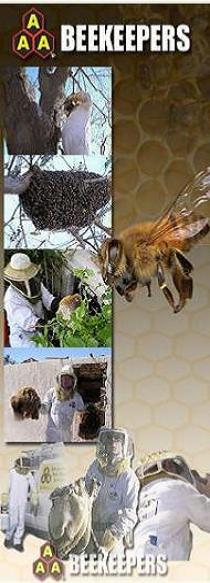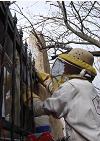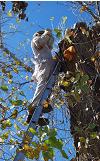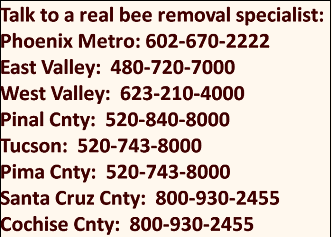













What Is A Real Bee Removal Specialist Company?
We are beekeepers from Arizona Bee Products. Each AZ bee removal specialist is a beekeeper who practices beekeeping and apiculture and knows bee control and how to handle a bee colony. AAA Beekeepers Company is a division of AAA Africanized Bee Removal Specialists, Inc fully licensed to perform bee control, wasp control and pest control service in Phoenix, Tucson and surrounding Arizona cities. Each certified bee removal specialist is individually licensed in addition to being a professionally trained AZ beekeeper in beekeeping and honeycomb removal. We are beekeepers and real bee removal specialists.
African bee removal, honeycomb removal, wasp removal and wasp nest removal can be very dangerous and honey bees, honeycomb, bee pheromone, wasp pheromone and wasp nests can damage your home. Mishandling a bee colony, improper bee removal, bee control, wasp removal, and wasp control methods, and improper honeycomb removal methods will worsen the damage, the danger, and further spread bee pheromone or wasp pheromone, which will lead to bee colony or wasp colony re-infestation. We are AZ beekeepers, honey bee removal, honeycomb removal, Africanized killer bee control and aggressive wasp removal, wasp nest removal and wasp control specialists, not just pest control.
A real Arizona bee removal specialist is a experienced beekeeper who practices beekeeping, is licensed by the State of Arizona in pest control and is highly trained and experienced in AZ bee removal, both in honey bee removal and African killer bee control, honeycomb removal, bee swarm removal, wasp removal, wasp nest removal and wasp control.
Shopping Bee Removal Cost? - What Questions Should You Ask Before Buying A Bee Removal Service?
1. What will your bee removal service do to prepare and calm the colony?
We as beekeepers, who practice beekeeping and understand bee control, will spend an hour or more, as required, to calm and prepare a bee colony prior to a bee removal. We use a queen simulated bee pheromone that we have carefully developed over the years in a bee smoker that causes the bee colony to group up around the queen rather than disperse and work in the cavity. It also keeps the honey bees calm and allows us to probe the site without exciting the honey bees and causing even more bee pheromone secretions and damage.
During this process, we also wait for the returning foraging field bees to rejoin the bee colony leaving zero to very few flying insects in the air outside the entrance before we start procedures.
2. Does your bee removal service just immediately spray the entrance with a strong insecticide?
As beekeepers who practice beekeeping and understand bee control, we know that without preparing and calming the bee colony, just spraying the entrance puts the bee colony in alarm and attack mode, causes them to secrete even more bee pheromone scent, and tremendously increases the bee pheromone damage to your home. This makes a proper bee removal unnecessarily difficult and dangerous. Additionally, it will cause some of the bees to flee the intrusion and may spread them out throughout your house walls or ceilings and may even drive them inside your house. This is a common procedure among our bee removal competitors and the worst possible pest control technique for solving a honey bee infestation problem. No beekeeper that practices beekeeping and understands bee control would do this with an active bee colony.
Poisoning the entrance only accelerates the bee problem, does nothing but increase the bee pheromone scent at the site and can lead to serious, unnecessary bee emergencies. Because of our beekeeping, bee control, honey comb removal and bee removal expertise, we are often called in to fix a bee problem after it has been aggravated and mishandled. Bee removal should not be dabbled in by pest control companies and inexperienced personnel. Pest control methods seldom provide a solution for a bee problem. Again, only beekeepers who practice beekeeping and understand bee control and how to handle an active colony know how to do this successfully, not pest control companies.
3. Do they make any effort to probe for honeycomb, check for honeycomb meltdown, and how do they do it?
We spend a great amount of time, sometimes several hours during the preparation phase, and while we are waiting for the foraging field bees to return, probing the site by drilling small toothpick sized holes and exploring the cavity the honey bees have occupied to develop a concise picture of the damage the honey bees have caused to your home. We use thin hard line probes that are inserted through these holes. The residual that is removed can tell us the age of the colony by the coloration of the brood comb and honey comb, exactly where the honey is stored in the cavity, and the quantity, depth, width and height of the honeycomb deposit. We never touch the main entrance during this process in order not to interrupt the flow of returning foraging field bees. Additionally, we will use optical scopes to explore the cavity if necessary.
Many of our bee removal competitors will just tell you that you have honeycomb and, either refer you to a honeycomb removal specialist like us, or offer to remove the honey combs at an additional price. We will prove to you that you do have a honeycomb problem while we are at your site during the preparation phase and show you the results of our probing. If a honeycomb removal is feasible and necessary, we will carefully explain it to you and provide you with a formal written quotation on a comprehensive, solution based, honeycomb removal process, not just a rip and tear out procedure that still leaves you with residual dripping honey, honeycomb tracks and does nothing for the bee pheromone deposits at the site. In fact, as honeycomb melts down, and it will, it can spread the bee pheromone further throughout the area of the site and make the chance of future bee infestation much worse. Improper methods will worsen the damage to your home.
4. What will the bee colony site look like after the bee removal service is finished spraying?
Are there still a lot of honey bees flying outside the entrance? Are the honey bees still going in and out of the entrance?
After spraying the entrance with a heavy phosphate poison or a strong residual insecticide, our bee removal competitors, commonly apply a pest strip at the entrance and tell you that it is sufficient to take care of any bees that are still alive inside the bee colony or the large number of returning foraging field bees. They commonly say to wait a couple of days and see how it goes. Unfortunately, it often doesn't go well and you have hundreds of aggravated stinging insects trapped outside the entrance for the period of time they asked you to wait for. Worse, they will seal the entrance before they can verify that the bee colony is dead thinking the residual poisons will kill the honey bees in confinement. Further, as mentioned previously, if the bee colony is not dead, it will recover and if the entrance is poisoned, or live bees are sealed in, the bees will search for another way out and this will often be inside your home.
5. Your bee removal service company and their service provider individually licensed in Arizona?
Please check at: http://www.sb.state.az.us/PCBusSearch.php
Caution! You get what you pay for! There is no inexpensive, quick fix for a developed bee infestation. Without proper care and treatment, your chances of re-infestation in the future are almost certain. A passing bee swarm will reoccupy a former bee colony site before it will choose another location. Don't risk the disaster of a poorly done job! Call us first and get the bee removal facts.
For Further Information, please contact our beekeeping and bee removal specialist affiliates at:
www.arizonabeeproducts.com
www.arizonahoneycompany.com
www.desertpollencompany.com
www.aaabeeremoval.com
Arizona Bee Removal, Wasp Removal, Honeycomb Removal Specialists
